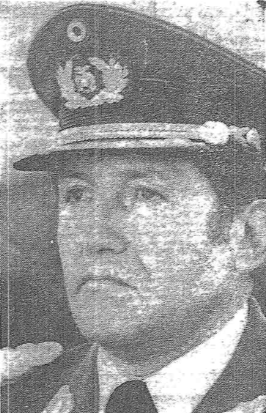Luis García Meza facts for kids
|
Luis García Meza
|
|
|---|---|
Quick facts for kids  |
|
| 57th President of Bolivia | |
| In office 17 July 1980 – 4 August 1981 |
|
| Vice President | Vacant |
| Preceded by | Lidia Gueiler (interim) |
| Succeeded by | Celso Torrelio |
| Personal details | |
| Born |
Luis García Meza Tejada
8 August 1929 La Paz, Bolivia |
| Died | 29 April 2018 (aged 88) La Paz, Bolivia |
| Spouses | Eldy Caballero Olma Cabrera |
| Children | 3 |
| Parents | Luis García Meza Crespo Alicia Tejada |
| Relatives | José Luis Tejada Sorzano (uncle) Lidia Gueiler (cousin) |
| Education | Military College of the Army |
| Signature | |
| Military service | |
| Allegiance | |
| Branch/service | |
| Years of service | 1952–1981 |
| Rank | General |
Luis García Meza Tejada (born August 8, 1929 – died April 29, 2018) was a general from Bolivia. He was the 57th president of Bolivia from 1980 to 1981, though he took power without an election. He was known as a dictator and was later found guilty of serious actions against people's rights. He led a forceful takeover of the government. Born in La Paz, he was a military officer who became a general during the time Hugo Banzer was in power (1971–1978).
Contents
Becoming a Leader
García Meza finished his studies at the military academy in 1952. He later served as its commander from 1963 to 1964. By the late 1970s, he had become a division commander.
He became a leader among military officers who were unhappy with Bolivia returning to civilian rule. Many of these officers had been part of the Hugo Banzer government. They did not like that the new Bolivian congress was looking into economic and human rights problems from Banzer's time. They also believed that the United States would soon have a new president who would support their ideas for a strong, anti-communist government in Bolivia.
The Coup d'état
| 1980 Bolivian coup d'état | |||||||
|---|---|---|---|---|---|---|---|
|
|||||||
| Belligerents | |||||||
|
Supported by: |
Supported by: |
||||||
| Commanders and leaders | |||||||
This group of officers pushed President Lidia Gueiler (who was his cousin) to make General García Meza the Commander of the Army. Within a few months, the military leaders, led by García Meza, carried out a forceful takeover of the government on July 17, 1980. This kind of takeover is called a coup d'état. When some people in the country tried to resist, many people died.
His Time as President (1980-1981)
García Meza was a very conservative and anti-communist leader. He wanted to create a strong government that would last for 20 years. He quickly made all political parties illegal. He also sent opposition leaders out of the country. He stopped trade unions from operating and controlled the news. He received support from people like Klaus Barbie, a former Nazi officer, and Stefano Delle Chiaie, an Italian neo-fascist. Other European neo-fascists, like Spanish Ernesto Milá Rodríguez, also helped him.
Even though García Meza's rule was short (it ended in 1981), it became known around the world for being very harsh. People in Bolivia faced similar restrictions as they did under the Banzer government. In January 1981, an organization called the Council on Hemispheric Affairs said that García Meza's government was one of the worst for human rights in Latin America. It is thought that about 1,000 people were killed by the Bolivian Army and security forces in just 13 months. His main enforcer was the Minister of Interior, Colonel Luis Arce. Arce Gómez once warned that anyone who disagreed with the new government should be prepared for serious consequences.
Life After Power
García Meza left Bolivia but was later found guilty in court, even though he was not there. He was convicted for the serious human rights violations that happened during his time in power. In 1995, he was brought back to Bolivia from Brazil. He was given a 30-year prison sentence. He was sent to the same prison where he once held his opponents. His main helper, Colonel Arce, was sent to the United States, where he also served time in prison.
Death
Luis García Meza died in La Paz on April 29, 2018. He passed away from a heart attack at the age of 88.
See also
 In Spanish: Luis García Meza para niños
In Spanish: Luis García Meza para niños
- Cabinet of Luis García Meza
- Roberto Suárez Goméz
 | Percy Lavon Julian |
 | Katherine Johnson |
 | George Washington Carver |
 | Annie Easley |

